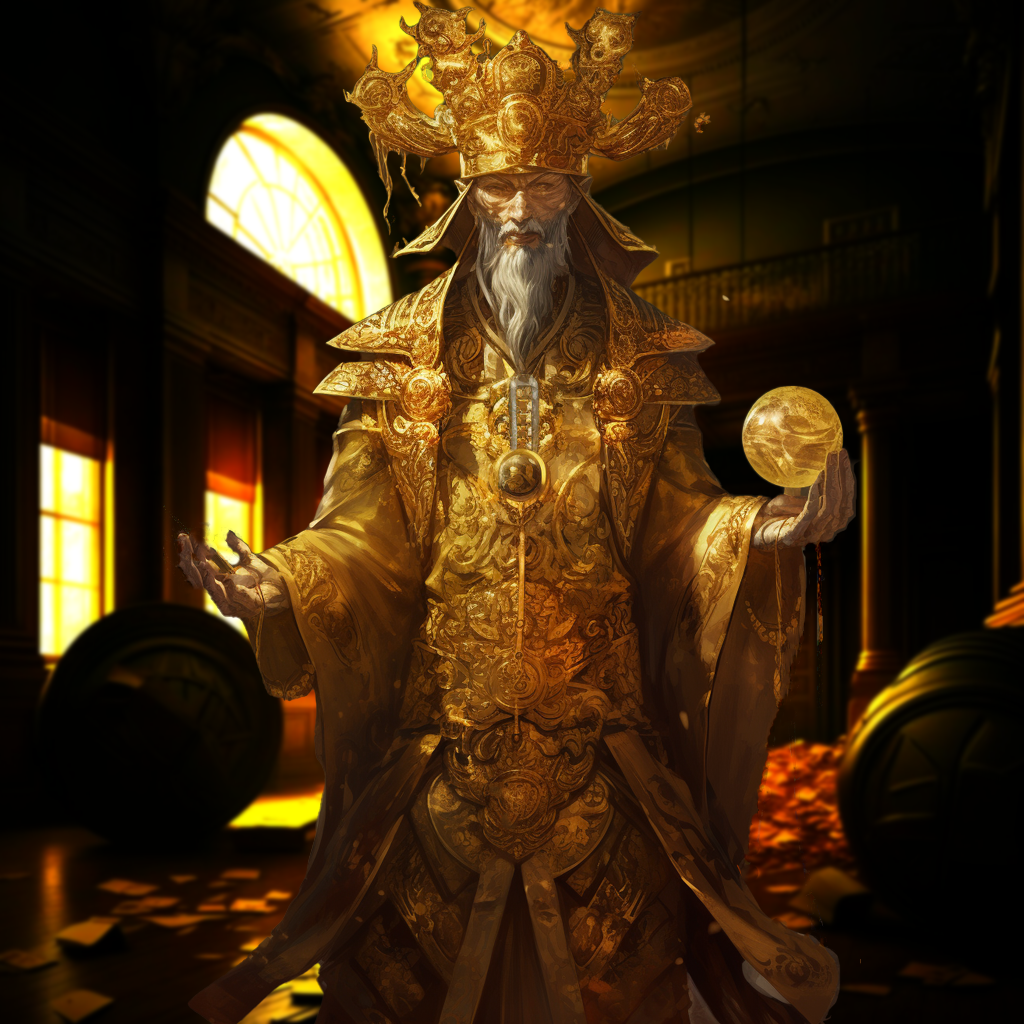The Pantheon: Mak-shen
Mak-shen:
Alignment: Lawful Evil
Portfolio: Wealth, greed, ambition, materialism, luxury, accumulation, avarice
Symbols: A treasure chest, a gold coin, a gem, a jeweled scepter, a golden chalice, a scale
Holy days: Midas' Touch, Hoarder's Feast
Relationship to Tyrannus: Sibling of Tyrannus, the God of Tyranny and Oppression
Relationship with Hephalos: Mak-shen often seeks to exploit Hephalos' craftsmanship and technology for his own greedy ends, looking for ways to increase his wealth and power.
Relationship with Pactura: Mak-shen is constantly scheming to manipulate Pactura's contracts and oaths to further his own interests, though the goddess of contracts is often wise to his tricks.
Relationship with Phoba-met: Mak-shen uses the fear and intimidation that Phoba-met instills in mortals to manipulate markets and amass even greater wealth.
Invoked: Wealth-seekers, merchants, and those obsessed with material gain invoke Mak-shen for prosperity and avarice; offerings of gold, gems, and valuable treasures are given.
Depiction: Mak-shen is a god of material wealth and greed, with a lustrous golden hue to his skin and gemstone-like eyes that sparkle with avarice. He is adorned in opulent clothing made from the finest silks and fabrics, encrusted with precious gems and gold. In one hand, he holds a treasure chest overflowing with coins, representing his insatiable greed and desire for accumulation, while a golden chalice and a set of scales rest in the other, symbolizing his fixation on materialism and luxury. Piles of riches and glittering objects surround him, further emphasizing his affinity for wealth and extravagance.
The Wager
In the ancient times when gods and mortals interacted more frequently, Mak-shen, the God of Greed and Ambition, conceived a grand scheme. He desired to possess the Sun's golden chariot, an artifact of immense power, and devised a high-stakes wager to secure it. Mak-shen challenged Solarius, the Sun God, to a game of divine chance. If Mak-shen won, he would gain the Sun's chariot, but if he lost, he would surrender all his worldly possessions to Solarius. Solarius, confident in his luck and swayed by the thought of putting an end to Mak-shen's greed, accepted the challenge.
However, Mak-shen had ulterior motives. He knew that if he gained control of the Sun's chariot, he could control the day and night, affecting the growth of crops, the tides of the sea, and the rhythm of life itself. With such power, he could manipulate mortals and gods alike, bending them to his will through threats and promises. The risk was great, but the potential rewards were greater still.
News of the wager spread quickly among the gods. Pactura, the God of Oaths and Contracts, upon hearing this, was troubled. He knew the chaos that would ensue if Mak-shen won. The balance of the world was at stake. But he also recognized the fairness of a wager, and he could not directly intervene.
Instead, Pactura devised a plan. He approached Mak-shen and offered to draft the contract for the wager. Mak-shen, confident and eager for his scheme to unfold, agreed without a second thought. He did not realize that Pactura was not just the god of contracts, but also the god of loopholes and conditions.
Pactura drafted the contract, stating clearly the terms of the wager. But he added a condition, hidden in the divine language and symbols of the contract. It stated that, should the result of the wager risk the balance of the world, a trial of fairness would be initiated. In this trial, both parties would have to prove that they truly deserved to win. This trial would not just measure luck or power, but also wisdom, justice, and the ability to use the winnings for the betterment of all.
The day of the wager came. Mak-shen and Solarius played the divine game of chance, and Mak-shen, employing all his cunning and guile, won. Triumphant, he reached out for the Sun's chariot, but it did not move. Pactura, witnessing the scene from afar, invoked the condition in the contract, initiating the trial of fairness.
Mak-shen was taken aback. He had not expected this. But confident in his ambition, he accepted the trial. Solarius, on the other hand, welcomed the opportunity to protect his chariot and the world.
In the trial, it became clear that Mak-shen sought the chariot not for the betterment of the world, but for his personal gain. Solarius, on the other hand, proved that he used the chariot to maintain the delicate balance of nature and life.
With the conclusion of the trial, the Sun's chariot returned to Solarius. Mak-shen was forced to surrender his worldly possessions, not to Solarius, but to the world itself, redistributing his wealth to those in need.
And so, the world was saved from a potential catastrophe by Pactura's cunning and wisdom. Mak-shen, humbled and defeated, learned a harsh lesson about the consequences of greed and ambition. And the gods and mortals alike learned the importance of fairness, justice, and the delicate balance of the world.
